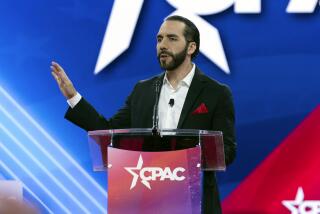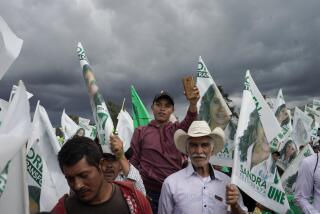Latins Back Contras Aid, Reagan Says : U.S.-Funded Poll Cited in Claim of Regional Support
- Share via
WASHINGTON — The Reagan Administration, armed with the results of a U.S.-financed public opinion poll, claimed Monday that an overwhelming majority of the population in Central America supports U.S. military aid to Nicaraguan rebels.
With the Democratic-controlled House scheduled to vote Thursday on President Reagan’s request for $100-million in aid to the rebels, known as contras , the Administration sought to demonstrate regional backing for its position. To date, however, no Central American leader has publicly endorsed military support for the contras.
Special envoy Philip C. Habib, just back from his first trip to the region, said that government officials there prefer political to military means but that all “understand the significance of putting pressure on the Sandinistas” to change the Managua regime’s policy.
Case Overstated
Reagan, talking to reporters before he received Habib’s official report, said public opinion polls show that “in some countries the rate goes as high as over 90% of the people who support what we’re doing.”
But White House spokesman Larry Speakes conceded later that Reagan had overstated the case. Speakes said the poll, taken by a Gallup subsidiary between June and November, before Reagan disclosed the details of his proposed aid package, showed that the U.S. policy was supported by 69% to 24% in Costa Rica; 55% to 25% in Honduras; 54% to 22% in Guatemala and 48% to 19% in El Salvador.
The rest of the sample in each country had no opinion in the survey, which Speakes said was commissioned and paid for by the U.S. Information Agency.
‘Open a Dialogue’
State Department spokesman Charles Redman said that the presidents of Guatemala, El Salvador, Costa Rica and Honduras all support U.S. objectives but have not endorsed military aid to the contras because they “are simply afraid of the Sandinistas. . . . They are intimidated by the military strength, the disposition of the Sandinista government to foment subversion.”
Nevertheless, Redman said that on Sunday, Presidents Jose Napoleon Duarte of El Salvador, Vinicio Cerezo of Guatemala, Jose Azcona Hoyo of Honduras and President-elect Oscar Arias of Costa Rica “issued a joint statement urging the world democracies to induce the rulers of Nicaragua to open a dialogue.
“Costa Rican President (Luis Alberto) Monge, in a statement issued this morning, stated that he believed international pressure on the Sandinistas has forced them to change their position on border issues with Costa Rica and concludes that ‘I can only judge that such pressures are necessary,’ ” Redman added.
‘Threat to Security’
The joint declaration of the Central American presidents, which called for peace negotiations between the contras and the Sandinistas and between Salvadoran Marxist rebels and the Duarte government, was initiated by Costa Rica’s Arias during a tour of the region after his election. The declaration had been signed by each of the presidents. Azcona signed it Sunday and it was announced as a joint action.
Secretary of State George P. Shultz, addressing a group of business leaders, said that democratic leaders of Central America “understand that the Nicaraguan Communists are a threat to their security. . . . They understand that without pressure--pressure is their word--of the democratic resistance, that the communists in Managua will have no incentive to compromise with their domestic rivals.”
Majority Leader Bob Dole (R-Kan.) said that the Republican-controlled Senate will vote Friday, one day after the House action, on Reagan’s program, which would provide $30 million for non-lethal items, suck as medicine and clothing, and $70 million that could be used for arms. The current program of $27 million in non-lethal aid expires March 31.
Rejection Forecast
House Democratic whip Thomas S. Foley of Washington predicted that his chamber would reject Reagan’s proposal. He said that Democrats were “very, very close” to having enough votes to defeat the package without any Republican help and that nine or 10 Republicans are expected to cross party lines.
Meanwhile, House Speaker Thomas P. (Tip) O’Neill Jr. (D-Mass.) disputed Reagan’s claim in his nationally televised speech Sunday that the $100 million was not new money but merely a “switch of a small part of our defense budget to the defense of our southern frontiers.”
“In a message to the Congress, the President has said that the $100 million must be replenished with a new appropriation of funds,” O’Neill said. “In other words, he made it clear that he intends to send a supplemental request to make up for the $100 million.”
Times staff writers Karen Tumulty and Robert Shogan contributed to this story.
More to Read
Sign up for Essential California
The most important California stories and recommendations in your inbox every morning.
You may occasionally receive promotional content from the Los Angeles Times.













